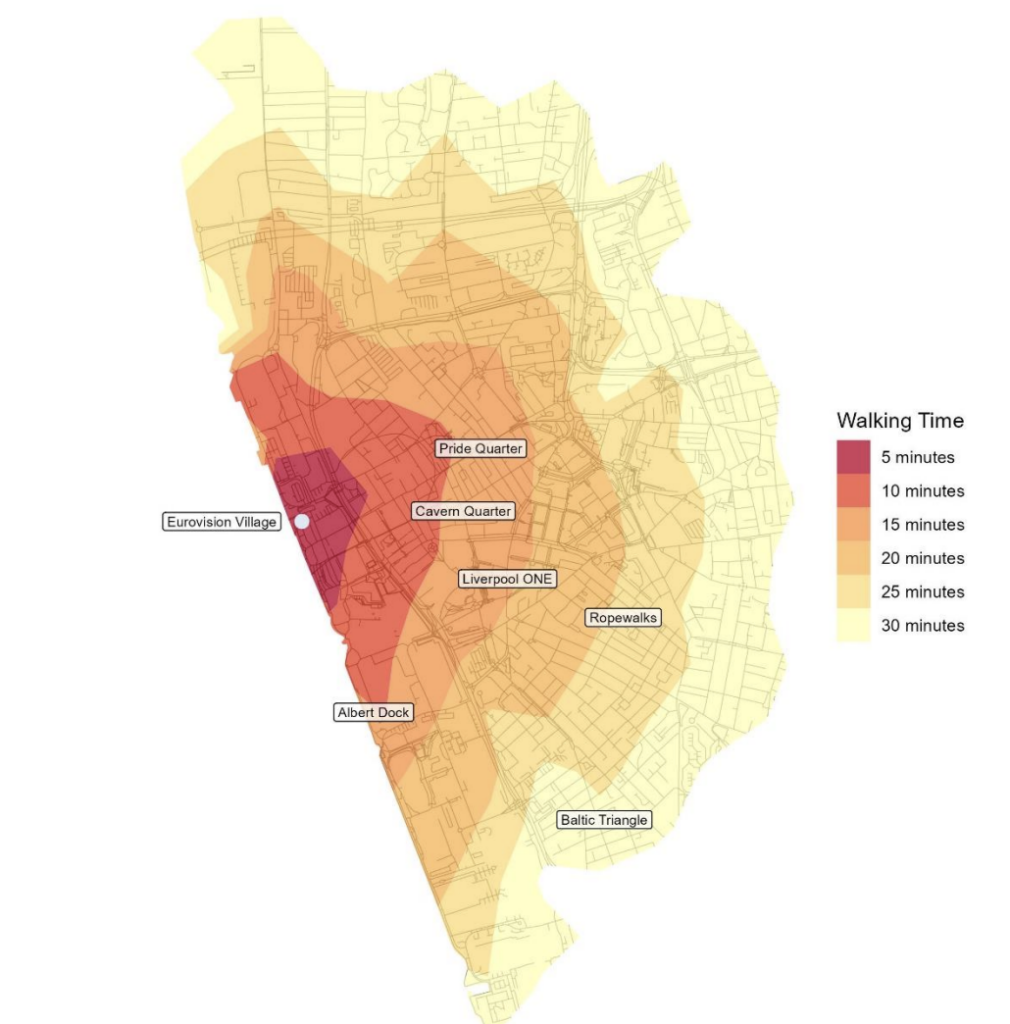Using Mastercard data to reveal the economic impact of Eurovision
When Liverpool stepped in to host the 2023 Eurovision Song Contest on behalf of Ukraine, researchers uncovered surprising economic patterns through innovative data analysis. The University of Liverpool team, using Mastercard’s smart transaction data, discovered that the event created a concentrated economic boost, primarily driven by domestic tourism, with the night-time economy emerging as the biggest winner.
At a glance
Domestic tourism drove spending increases: Despite Eurovision’s international audience, most increased spending came from UK residents rather than overseas visitors
The night-time economy flourished: Bars and nightclubs saw a 6% increase in transactions, while places to eat experienced an 11% increase in spending
Hyper-local economic boom occurred: Businesses within a 15-minute walk of the Eurovision Village thrived, while districts over 25 minutes away saw lower spending

The research opportunity
The economic impact of large-scale music events, like Taylor Swift’s ‘Eras’ tour, has been well documented. Research has also highlighted the significant challenges facing the UK’s small venues, nightclubs and bars. However, there has been less focus on the impact of ‘one-off’ large-scale events on the economy of our cities and regions.
So, when Eurovision landed on their doorstep, two teams of academics at the University of Liverpool found themselves with a unique opportunity. The researchers from the Institute of Popular Music and Geographic Data Service set out to discover the economic winners and losers during the Eurovision tourism boom.
A new approach to measuring economic impact
Traditional methods of measuring economic impact often rely on visitor surveys, which can be limited by respondents’ geographic knowledge and recall accuracy. For this study, the team drew on data from Mastercard, using the company’s Geographic Insights Platform, which provides anonymised, aggregated, and indexed purchase data.
The dataset contained metrics for:
- Spend activity across different time periods
- Industry-specific transaction data (e.g., cafés and restaurants, hotels, music venues)
- Customer origin information (domestic vs. international)
- Different levels of spend per Mastercard account
Using this data, researchers compared consumer spending during Eurovision week (6-13 May 2023) with the same week in the previous month.

Detailed findings
Domestic tourism drove spending increases
Despite Eurovision’s international audience, the Mastercard data revealed that the majority of increased spending came from UK residents rather than overseas visitors. This was a surprising finding, given that Eurovision is a festival with a large international audience.
Night-time economy flourished
The hospitality sector saw significant gains:
- Eating establishments experienced an 11% increase in spending
- Bars, pubs and nightclubs saw a 6% increase in transactions
Spending was lower on accommodation and entertainment venues. As hotel reservations and bookings are usually made in advance, this could indicate a lack of capacity for additional visitors during Eurovision 2023. The poorer performance of other entertainment venues adds to the debate about whether small music venues benefit from large events.

Hyper-local economic boom
The researchers used “isochrone” mapping to analyse spending patterns based on walking distance from the Eurovision Village at Pier Head to other parts of the city. They discovered:
- Businesses within a 15-minute walk of the Village fared better in terms of transactions
- Districts over 25 minutes’ walk from the Village saw lower levels of spending
“This research demonstrates the value of smart data in uncovering new evidence about cities at different spatial scales and shows the power of using data from companies like Mastercard to inform decision-making about the impact of mega events on local economies.”
Dr Patrick Ballantyne, University of Liverpool

Practical implications for cities and events
The study demonstrates how smart data can transform how cities plan and evaluate major events, offering several concrete benefits:
For city planners and local authorities
Resources might be directed to businesses beyond the 15-minute radius that might otherwise miss out on event benefits.
For business communities
Businesses located outside prime areas could establish temporary locations within the 15-minute radius of event hubs. Night-time economy businesses can forecast staffing and inventory needs based on expected transaction increases.
For future research and policy
Cities can make more accurate economic forecasts when bidding to host major events. Success measures can be expanded beyond total economic impact to include geographic distribution of benefits.
This data-driven approach represents a significant change in how cities can understand, measure and maximise the benefits of hosting major events, ensuring the economic boost reaches more businesses and communities.
Find out more
View the policy brief – “Eurovision’s economic impact in Liverpool: Insights for Future large-scale events”.
The mission of Smart Data Research UK is to unlock the power of data to improve lives. One of our four areas of focus is productivity and prosperity. We want to explore how smart data can inform policymaking, providing governments and authorities with valuable – and actionable – insights about the places where people live, work and play.
Smart Data Research UK would love to hear about your research!
Do you have a smart data case study to share? Contact our team at smartdataresearch@ukri.org to showcase your work.
